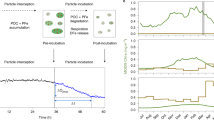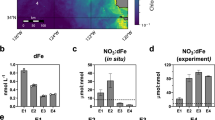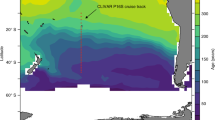Abstract
MANY attempts1–9 have been made to explain why the concentration of atmospheric oxygen remains steady at ∼21%. I previously suggested that the turnover of marine and brackish water sediments promotes a recurrent demand for dissolved oxygen by alternately oxidising and reducing insoluble inorganic iron. Oxygen incorporated with sediments by this means combines with hydrogen to form water—thus preventing to some extent that loss of hydrogen by which Earth is oxidised4,7. It is now apparent that regulation of molecular oxygen cannot be brought about by iron alone because the rate of turnover (even of shallow water sediments) is not fast enough13. Nor can sulphur (on its own or in association with iron) effect the transfer of sufficient oxygen from the aerobic to the anaerobic environment if rates of microbial activity in deep sea sediments are generally 1–2 orders of magnitude slower than in those of the continental shelves12,15 propose, therefore, that six elements (N, Mn, Fe, S, C, H) circulate in reduced and oxidised forms between the aerobic and anaerobic environments and bring about ‘redox regulation of atmospheric oxygen’.
This is a preview of subscription content, access via your institution
Access options
Subscribe to this journal
Receive 51 print issues and online access
$199.00 per year
only $3.90 per issue
Buy this article
- Purchase on Springer Link
- Instant access to full article PDF
Prices may be subject to local taxes which are calculated during checkout
Similar content being viewed by others
References
Berkner, L. V. & Marshall, L. C. J. atmos. Sci. 22, 225 (1965).
Board, P. A. Atmos. Envir. 10, 339 (1976).
Garrels, R. M. et al. Am. Sci. 64, 306 (1976).
Lovelock, J. E. & Lodge, J. P. Atmos. Envir. 6, 575 (1972).
Lovelock, J. E. & Margulis, L. Tellus 26, 1–2 (1974).
Sillén, L. G. Acta. Chem. Scand. 18, 1016 (1954).
Sillén, L. G. Tellus 18, 198 (1966).
Van Valen, L. Science 171, 439 (1971).
Walker, J. C. G. Am. J. Sci. 274, 193 (1974).
Baas Becking, L. G. M. et al. J. Geol. 68, 243 (1960).
Hutchinson, G. E. in The Solar System (ed. Kuiper) (University of Chicago Press, Chicago, 1954).
Jannasch, H. W. & Wirsen, C. O. Science 180, 64 (1973).
Jørgensen, B. B. Limnol. Oceanogr. (in the press).
Lewis, G. N. & Randall, M. in Thermodynamics and the free energy of chemical substrates (McGraw Hill, London, 1923).
Smith, K. L. & Teal, J. M. Science 179, 282 (1973).
Author information
Authors and Affiliations
Rights and permissions
About this article
Cite this article
BOARD, P. Redox regulation of atmospheric oxygen and its consequences. Nature 270, 591–592 (1977). https://doi.org/10.1038/270591a0
Received:
Accepted:
Issue Date:
DOI: https://doi.org/10.1038/270591a0
Comments
By submitting a comment you agree to abide by our Terms and Community Guidelines. If you find something abusive or that does not comply with our terms or guidelines please flag it as inappropriate.



